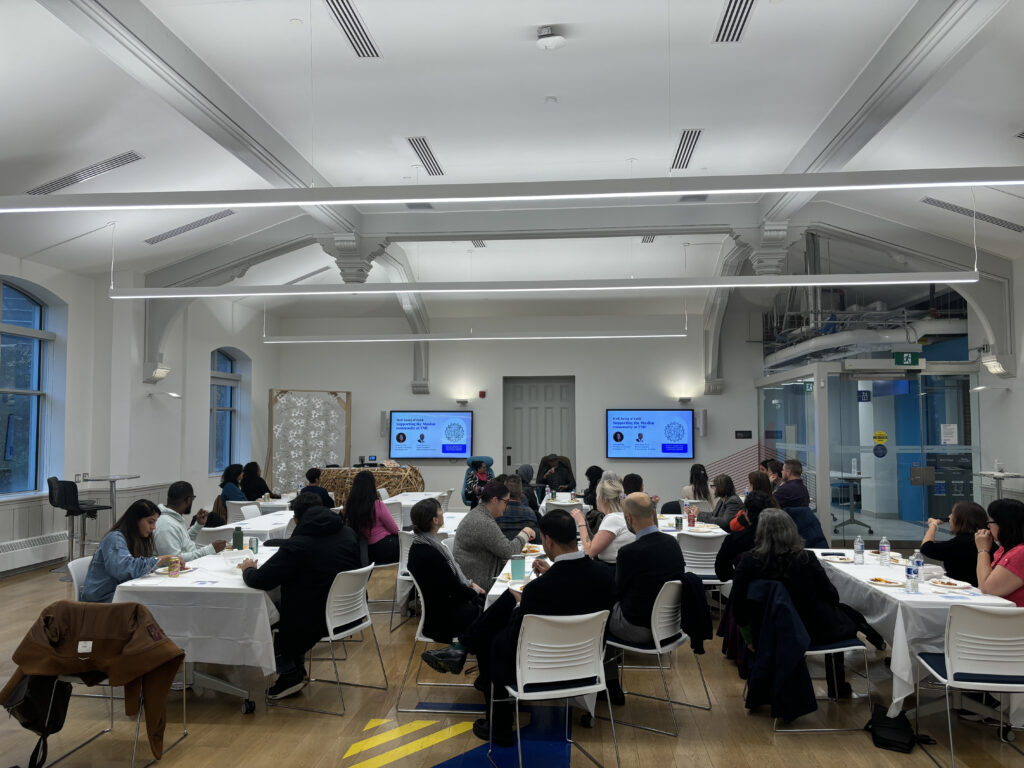
Listen to the whole story here:
November is National Career Development Month in Canada, but for many Canadian Muslim women, entering the workforce remains frustratingly tough, an issue surfaced most recently in an ASPIRE study. The study found that 44 per cent of Canadian Muslim women are currently employed, compared to the 55 per cent of Canadian non-Muslim women and 58 per cent of the general Canadian population.
This was also a topic of discussion at a recent Toronto Metropolitan University (TMU) event, entitled Well-being and Faith: Supporting the Muslim community at TMU, which was held at the Centre of Urban Innovation on Oct. 29. According to marketing material, the goal was to “foster a deeper understanding of the diversity of the Muslim community.”
“There needs to be a lot of work in unpacking and understanding that the piece of cloth on the head doesn’t affect one’s ability to work,” said Dr. Katherine Bullock. Bullock is a political science lecturer at the University of Toronto. “It doesn’t clothe the mind, it doesn’t muffle the mind. It’s just covering the head.”
The Canadian Council of Muslim Women (CCMW) released the study on June 20, 2024 entitled Addressing Systematic Problems and Inequities to Resolve Employment Issues (ASPIRE), part of a multi-year project meant to “have a better understanding and response to employment barriers Canadian Muslim women face.”
“It shows there’s a stagnancy of issues that aren’t being addressed,” said Bullock when asked about the study.
The study also found that Canadian Muslim women are “on average, more educated than the general Canadian population” yet “Canadian Muslim women had lower rates of full-time employment compared to their general Canadian counterpart.”
“I worked hard for my PhD. I have twenty years of service at York University. I still have to prove myself today,” said Dr. Minoo Derayeh, a professor at York University. Derayeh described experiences where she felt the need to fight for her voice to be heard in professional settings. “So I have to say all the time, ‘listen to me and hear me,’ and with my other colleagues, they don’t have to say that.”
Derayeh said she believes that this stems from a lack of respect for Canadian Muslim women in professional work environments, even when they have shown that they have the proper qualifications.
“They are qualified, they have great degrees, but usually they don’t make it to the short list in the hiring process, and even if they make it to the short list, the hurdles during the interview are horrible,” said Derayeh.
Bullock says that even if an employer has a “reasonable accommodation policy” in place to adhere to any arrangements female Muslim employees may need, does not mean that the employer will implement their policies.
“Let’s say accommodation policies for Ramadan, a lot of people are afraid to ask for it because apparently scheduling can be a bit tricky, and they feel if they ask for an accommodation for Ramadan, meaning ‘I could leave, not get my shift, put over those hours where I might want to be eating,’ apparently this upsets scheduling managers, and so they often don’t ask for those accommodations,” she said.
The research from the ASPIRE study suggests that this could stem from barriers that “appear to be arbitrary and not embedded in policy or resulting from an organization’s functioning. Rather, they seem to result from an organization’s structure, namely in maintaining and reproducing racial hierarchies.”
Even when Canadian Muslim women are brought into a business, Derayeh says it is not uncommon for them to find themselves on the outskirts.
“The minute Muslims and people such as me enter a meeting, we are disqualified because of our needs and names, it brings a heavy load that creates questions in the minds of people who are sitting thinking, ‘am I crazy to hire this person,” she said.
Derayeh relates this back to the idea of tolerance, that Canadian Muslim women are being held at arm’s length at their jobs.
“Our society is still talking about tolerance in our diversity, what is tolerance?” said Derayeh. “When I see you, you are a Muslim woman; I tolerate you. And when I don’t see you, I don’t have to tolerate you.”
*We reached out to Toronto Metropolitan University for comment, but we did not receive comment in time for publication*
My name is Adriana Fallico, and I am interested in all things current affairs, political discussions and fashion. You can always find me glaring at my phone or worshipping the PWHL Toronto team.
This article may have been created with the use of AI tools such as Google Docs, Grammarly, and/or Otter.ai for transcription.

